Related Research Articles
Computer music is the application of computing technology in music composition, to help human composers create new music or to have computers independently create music, such as with algorithmic composition programs. It includes the theory and application of new and existing computer software technologies and basic aspects of music, such as sound synthesis, digital signal processing, sound design, sonic diffusion, acoustics, electrical engineering, and psychoacoustics. The field of computer music can trace its roots back to the origins of electronic music, and the first experiments and innovations with electronic instruments at the turn of the 20th century.

Lucasfilm Games is an American video game licensor and a subsidiary of Lucasfilm. It was founded in May 1982 by George Lucas as a video game development group alongside his film company; as part of a larger 1990 reorganization of the Lucasfilm divisions, the video game development division was grouped and rebranded as part of LucasArts. LucasArts became known for its line of adventure games based on its SCUMM engine in the 1990s, including Maniac Mansion, the Monkey Island series, and several Indiana Jones titles. A number of influential game developers were alumni of LucasArts from this period, including Brian Moriarty, Tim Schafer, Ron Gilbert, and Dave Grossman. Later, as Lucasfilm regained control over its licensing over the Star Wars franchise, LucasArts produced numerous action-based Star Wars titles in the late 1990s and early 2000s, while dropping adventure game development due to waning interest in the genre.
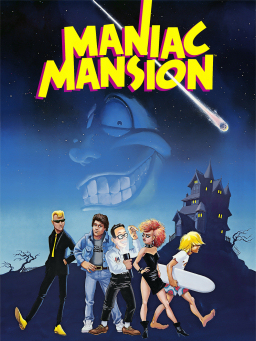
Maniac Mansion is a 1987 graphic adventure video game developed and published by Lucasfilm Games. It follows teenage protagonist Dave Miller as he attempts to rescue his girlfriend Sandy Pantz from a mad scientist, whose mind has been enslaved by a sentient meteor. The player uses a point-and-click interface to guide Dave and two of his six playable friends through the scientist's mansion while solving puzzles and avoiding dangers. Gameplay is non-linear, and the game must be completed in different ways based on the player's choice of characters. Initially released for the Commodore 64 and Apple II, Maniac Mansion was Lucasfilm Games' first self-published product.
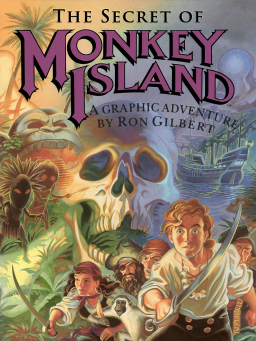
The Secret of Monkey Island is a 1990 point-and-click graphic adventure game developed and published by Lucasfilm Games. It takes place in a fictional version of the Caribbean during the age of piracy. The player assumes the role of Guybrush Threepwood, a young man who dreams of becoming a pirate, and explores fictional islands while solving puzzles.
The Internet Oracle is an effort at collective humor in a pseudo-Socratic question-and-answer format.
Michael Z. Land is an American video game composer and musician best known for his scores for various games produced by LucasArts.

Monkey Island 2: LeChuck's Revenge is an adventure game developed and published by LucasArts in 1991. Players control the pirate Guybrush Threepwood, who searches for the legendary treasure of Big Whoop and faces the zombie pirate LeChuck.

The Atari XE Video Game System is an industrial redesign of the Atari 65XE home computer and the final model in the Atari 8-bit computer series. It was released by Atari Corporation in 1987 and marketed as a home video game console alongside the Nintendo Entertainment System, Sega's Master System, and Atari's own Atari 7800. The XEGS is compatible with existing Atari 8-bit computer hardware and software. Without keyboard, the system operates as a stand-alone game console. With the keyboard, it boots identically to the Atari XE computers. Atari packaged the XEGS as a basic set consisting of only the console and joystick, and as a deluxe set consisting of the console, keyboard, CX40 joystick, and XG-1 light gun.

Noah Falstein is a game designer and producer who has been in the video game industry since 1980, winning "Game of the Year" titles for multiple games such as Battlehawks 1942 and Indiana Jones and the Fate of Atlantis. He has designed games for multiple platforms, including arcade video games, Commodore 64, and MS-DOS.
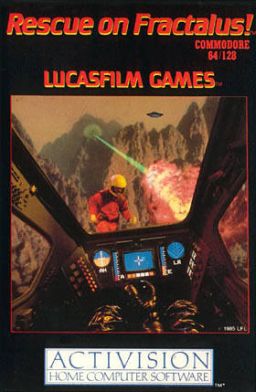
Rescue On Fractalus! is a space combat simulator video game created by Lucasfilm Games. It was originally released in 1985 for the Atari 8-bit computers and Atari 5200 console, then ported to the Apple II, ZX Spectrum, Amstrad CPC, Tandy Color Computer 3, and Commodore 64. The player flies a space fighter near the surface of a planet, with the goal of rescuing downed pilots. The terrain is generated via fractals, from which the eponymous planet and game title are taken.
The Works is a shelved animated feature film, partially produced from 1979 to 1986. If it had been finished, it would have been the first film that was entirely 3D computer-animated. It included contributions from individuals who would go on to work at digital animation pioneers Pixar and DreamWorks Animation.
Timothy John Follin is an English video game music composer, cinematographer, visual effects artist and game developer, who has written tracks for a variety of titles and home gaming systems, including the ZX Spectrum, Commodore 64, Amiga, Atari ST, Nintendo Entertainment System, Mega Drive, Super NES, Game Boy, Dreamcast, and PlayStation.
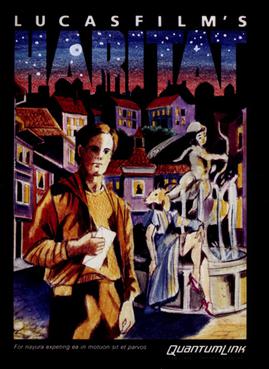
Habitat is a massively multiplayer online role-playing game (MMORPG) developed by LucasArts. It is the first attempt at a large-scale commercial virtual community that was graphic based. Initially created in 1985 by Randy Farmer, Chip Morningstar, Aric Wilmunder and Janet Hunter, the game was made available as a beta test in 1986 by Quantum Link, an online service for the Commodore 64 computer and the corporate progenitor to AOL. Both Farmer and Morningstar were given a First Penguin Award at the 2001 Game Developers Choice Awards for their innovative work on Habitat. As a graphical MUD it is considered a forerunner of modern MMORPGs unlike other online communities of the time. Habitat had a GUI and large user base of consumer-oriented users, and those elements in particular have made Habitat a much-cited project and acknowledged benchmark for the design of today's online communities that incorporate accelerated 3D computer graphics and immersive elements into their environments.
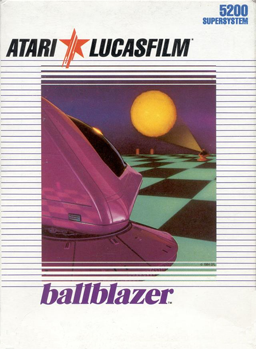
Ballblazer is a futuristic sports game created by Lucasfilm Games and published in 1985 by Epyx. Along with Rescue on Fractalus!, it was one of the initial pair of releases from Lucasfilm Games, Ballblazer was developed and first published for the Atari 8-bit computers. The principal creator and programmer was David Levine. The game was called Ballblaster during development; some pirated versions bear this name.
David Fox is an American multimedia producer who designed and programmed numerous early LucasArts games. He and his wife, Annie Fox, now work on educational software, web design, emotional intelligence content, online communities, emerging technologies, and writing books for children and teens.

Labyrinth: The Computer Game is a graphic adventure game developed by Lucasfilm Games and published in 1986 by Activision. Based on the fantasy film Labyrinth, it tasks the player with navigating a maze while solving puzzles and evading dangers. The player's goal is to find and defeat the main antagonist, Jareth, within 13 real-time hours. Unlike other adventure games of the period, Labyrinth does not feature a command-line interface. Instead, the player uses two scrolling "word wheel" menus on the screen to construct basic sentences.

Don Daglow is an American video game designer, programmer, and producer. He is best known for being the creator of early games from several different genres, including pioneering simulation game Utopia for Intellivision in 1981, role-playing game Dungeon in 1975, sports games including the first interactive computer baseball game Baseball in 1971, and the first graphical MMORPG, Neverwinter Nights in 1991. He founded long-standing game developer Stormfront Studios in 1988.
Chip Morningstar is an American software architect, mainly for online entertainment and communication.
Empire is a 4X computer wargame created in 1972 by Peter Langston, taking its name from a Reed College board game of the same name. It was initially created by Langston in BASIC on an HP2000 minicomputer at Evergreen State College. When the host computer was retired, the source code to the game was lost. Subsequently, two other authors each independently wrote a new version of the game, both named Empire. In the decades since, numerous other versions of Empire have been developed for a wide variety of platforms.

Wander is text adventure written by Peter Langston in 1974. It is one of the earliest text adventure video games in existence, predating Colossal Cave Adventure. The game was originally coded in BASIC on a mainframe computer with multiple databases to create the worlds that formed the game. It was distributed in Langston's PSL Games collection for Unix.
References
- ↑ McWhertor, Michael (March 21, 2014). "Lucasfilm Games vets look back on the earliest days of George Lucas' game company". Polygon. Retrieved November 20, 2024.
- ↑ Wawro, Alex (March 19, 2024). "The early days of Lucasfilm Games, as told by those who lived it". Game Developer. Retrieved November 20, 2024.
- ↑ Rignall, Jaz (December 26, 2015). ""I actually was hunting Ewoks." The Original Lucasfilm Games Team Talk About Life at Skywalker Ranch". VG247. Retrieved November 20, 2024.